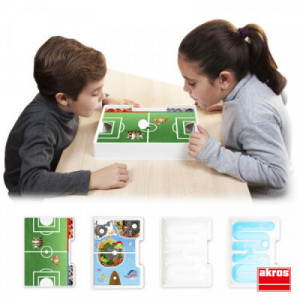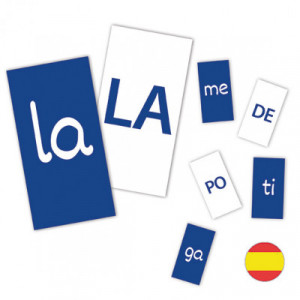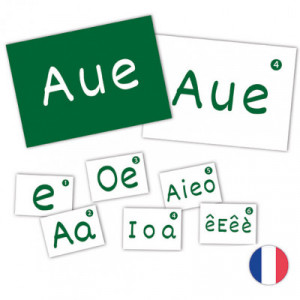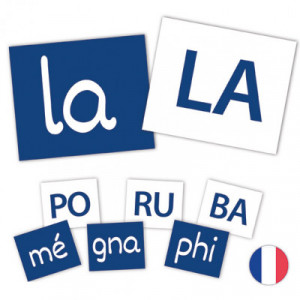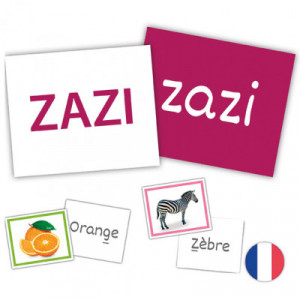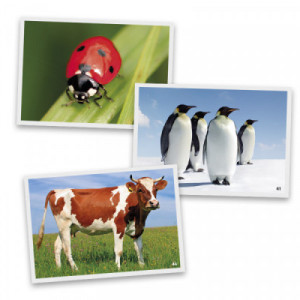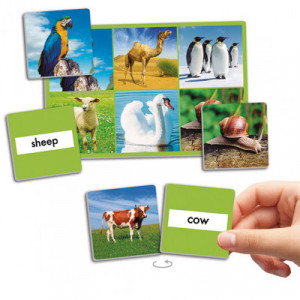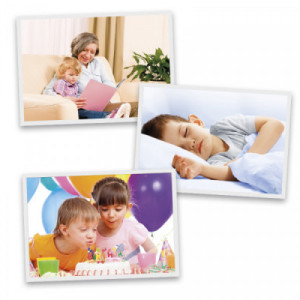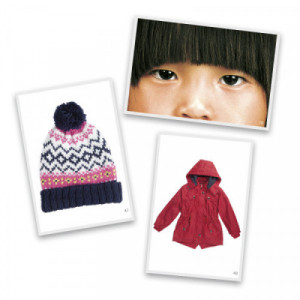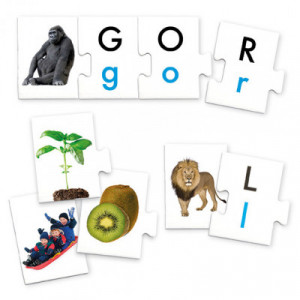Communication impairment (Dysphasia)
Dysphasia is a language acquisition disorder that manifests itself in an alteration of speech expression and comprehension.
Depending on the type of dysphasia that the child has (comprehension, expression or mixed), the game must be oriented to work on what we want to promote, always from a playful and fun perspective. With exercises of orofacial praxias, morphosyntactic exercises or exercises that work the communication we will help you to work the expression. With exercises of discrimination and auditory memory, semantic field or that associate vocabulary with images, we will favour the development of comprehension.
Don't miss this selection of letter games, words, images and stories for children with dysphasia.
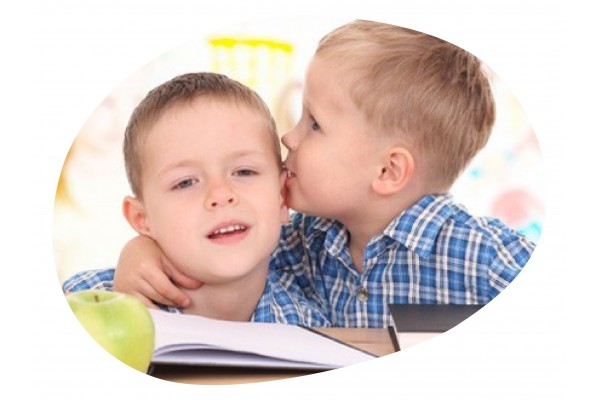
Lecto-bits cards with phonetic syllables for learning to read and improving reading skills
Logo-bits cards with all the consonant clusters for improving pronunciation according...
Lecto-bits de syllabes simples pour soutenir la parole et améliorer la lecture
Logo-bits de capacité articulatoire pour corriger la prononciation selon le point...
What is childhood dysphasia?
Dysphasia is a disorder in language acquisition that manifests itself when it comes to expressing and understanding language. Children with dysphasia have impaired expression and language. They express themselves through gestures or mimicry.
Although it may seem a little strange, the dysphasia is explained by everything it is not. This refers to the fact that dysphasia is considered to be a problem that is perceived in language and that is not attributed to intellectual disability, sensory problems, psychological trauma or obvious brain damage.
What are the main symptoms of dysphasia?
The most common symptoms of dysphasia in children are related to language expression and understanding and will help you diagnose it:
- Does not pronounce grammar elements to organize phrases.
- They usually have no communication intentions.
- They cannot use personal pronouns.
- They use the verbs in infinitive.
- They don't know how to remember and repeat very long sentences.
- They relate well through gestures.
- They repeat words without knowing their meaning.
All this is accompanied by other symptoms such as:
- Spatial-temporal alteration.
- Problems in orofacial praxis.
- Psychomotor difficulties
- Attention deficit and hyperactivity.
- Alterations in auditory memory.
It is frequent to find difficulties or problems to differentiate sounds, memorize, pay attention, fine motor activities (such as painting with pencil, brush, waxes...), change the body scheme from right to left and in the visual- spatial perception.
The symptoms of dysphasia in children and their evolution depend very much on the specific case. In some cases, the language difficulties are more severe and it is difficult to progress in the treatment, while in others, there is another series of cases that only deal with a series of disorders that affect the child.
Classification of dysphasias in children
Within this section are different classifications that meet different criteria. The classification is divided into motor or expressive, sensory or receptive and mixed.
- Motor or Expressive Dysphasia, characterized by intelligence, hearing and understanding of language within normal limits. They are incapable of imitating words, phonemes and not being able to have spontaneous language.
- Sensory or Receptive, also known as \verbal deafness\". Patients have a normal or delayed coefficient. They are unable to name objects, cannot imitate words or interpret environmental language.
- Mixed dysphasia, has motor and sensory symptoms.
Childhood Dysphasia: Causes
The most common causes of dysphasia in children are genetic and neurobiological factors. It affects both sexes differently. So far there are more boys than girls with dysphasia.
As we have already explained, there are different types of dysphasia. And in many cases it is difficult to detect what the causes are but others are related to:
- Brain injury or lack of oxygen when the baby is born.
- A head trauma at the time of delivery.
- Diseases such as meningitis, encephalitis that affect the central nervous system.
It is not easy to find out whether or not the disease is due to a brain injury. Therefore, it cannot be said that these are the causes of the problem, but they do influence the delay in ripening.
There are more factors that can trigger the problem, such as a long hospital stay or a bad family environment.
Consequences of dysphasia
Children with dysphasia have difficulty in expressing themselves and understanding, which is why society isolates them and makes it difficult for them to integrate socially. Because of this, misdiagnoses such as delayed language development, deafness, or autism are made.
These problems influence the academic level, in most cases there is a failure of literacy and basic learning.
The consequence of all this will be psychological disorders such as affective disorders, emotional problems, anxiety traits, self-esteem deficits and sometimes character problems.
The evolution and the consequences really depend on each child and on the way they are treated.
How to help children with dysphasia at home
Dysphasia in children can be progressively overcome when appropriate methods are used. It is advisable to know that all cases are different and independent, so that learning must also be individualized so that the expected objectives can be achieved. Before attempting to correct defects or remove barriers, treatment should be adapted to different cases in particular
The neurological and psychological maturity of the child is essential for setting goals and intervention strategies.
It is recommended that parents of children with dysphasia be well informed and participate in their children's treatment. The intervention strategy depends on the case of dysphasia, but here are some games or activities that may help.
When we try to interact with children with dysphasia we must be aware that the sick person knows what he or she means and hears the words correctly in his or her head.
Rather than attempting to correct shortcomings or remove barriers, programmes should be tailored to each particular learning case. The language should be made accessible to the child by means of speech therapy material where he or she can work on the linguistic elements that cause him or her the most difficulty.
Alternative and augmentative communication systems are increasingly being used, as opposed to other intervention strategies when there is a lack of oral language development.
Games for children with children's dysphasia
- Auditory discrimination exercises: through which the child learns to distinguish different sounds that are familiar.
- Exercises to expand vocabulary: from concepts, words, knowledge that later increase in level of difficulty. These exercises are very useful with language games. Story dice, photos and bit logos will get you to practice your vocabulary and work on it like a game. The child will strive to tell stories through the images that their educators will show them. In this way, too, they will work the memory.
- Exercises and oral-facial praxies to achieve a perfect pronunciation, a good exercise for it is the game of the blow.
- Activities to place semantic fields such as association games. With these image cards and through games the child will learn to associate concepts with common features or to place them within the same lexical family.
- You can also use more games and exercises that increase verbal comprehension, exercise your morphosynthetics and understand the irganization and structuring of phrases and sentences.














